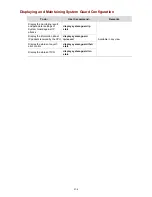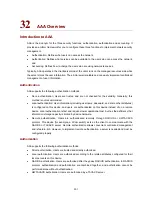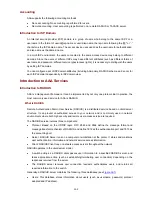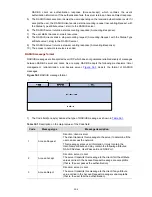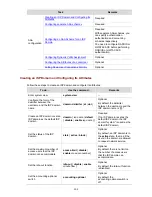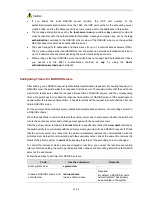
33-5
Follow these steps to configure separate AAA schemes:
To do…
Use the command…
Remarks
Enter system view
—
system-view
Create an ISP domain and
enter its view, or enter the view
of an existing ISP domain
Required
domain
isp-name
authentication
{
radius-scheme
radius-scheme-name
[
local
] |
hwtacacs-scheme
hwtacacs-scheme-name
[
local
] |
local
|
none
}
Optional
Configure an authentication
scheme for the ISP domain
By default, no separate
authentication scheme is
configured.
Optional
Configure a HWTACACS
authentication scheme for user
level switching
authentication super
hwtacacs-scheme
hwtacacs-scheme-name
By default, no HWTACACS
authentication scheme is
configured.
Optional
authorization
{
none
|
hwtacacs-scheme
hwtacacs-scheme-name
}
Configure an authorization
scheme for the ISP domain
By default, no separate
authorization scheme is
configured.
accounting
{
none
|
radius-scheme
radius-scheme-name
|
hwtacacs-scheme
hwtacacs-scheme-name
}
Optional
Configure an accounting
scheme for the ISP domain
By default, no separate
accounting scheme is
configured.
z
RADIUS scheme and local scheme do not support the separation of authentication and
authorization. Therefore, pay attention when you make authentication and authorization
configuration for a domain: When the
scheme radius-scheme
or
scheme local
command is
executed and the
authentication
command is not executed, the authorization information returned
from the RADIUS or local scheme still takes effect even if the
authorization none
command is
executed.
z
The Switch 4500 adopts hierarchical protection for command lines so as to inhibit users at lower
levels from using higher level commands to configure the switches. For details about configuring a
HWTACACS authentication scheme for low-to-high user level switching, refer to
Switching
User
Level
in the
Command Line Interface Operation
.
Configuration guidelines
Suppose a combined AAA scheme is available. The system selects AAA schemes according to the
following principles:
z
If authentication, authorization, accounting each have a separate scheme, the separate schemes
are used.
z
If you configure only a separate authentication scheme (that is, there are no separate authorization
and accounting schemes configured), the combined scheme is used for authorization and

